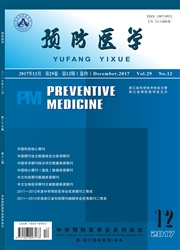

 中文摘要:
中文摘要:
目的 应用模糊数学综合评价方法评价农村小型集中式供水水质的卫生质量。方法 随机抽取金华市15家农村小型集中式供水设施,按照GB 5750—2006《生活饮用水标准检验方法》检测其卫生相关指标,并依据WS/T 199—2001《公共场所卫生综合评价方法》对检测结果进行模糊数学综合评价。结果 15家农村小型集中式供水设施检测合格率为6.67%。检测项目中耐热大肠菌群合格率为26.67%,总大肠菌群合格率为6.67%,菌落总数、氟化物、氯化物、硫酸盐、溶解性总固体、铁、耗氧量、总硬度和硝酸盐合格率为100.00%。供水设施卫生质量经模糊隶属度评判,Ⅰ级(良好)、Ⅱ级(合格)和Ⅳ级(很差)的各有4家,Ⅲ级(较差)有3家,卫生质量模糊综合指数均〈0.5。结论 金华市农村小型集中式供水设施存在安全风险,总大肠菌群和耐热大肠菌群合格率低是造成供水合格率低的主要原因。有关部门应加强管理、安装消毒设备、规范消毒,提高水质合格率。
 英文摘要:
英文摘要:
Objective To evaluate sanitary quality of drinking water of small centralized water supply in rural areas using fuzzy comprehensive evaluation method. Methods Fifteen rural small centralized water supply facilities in Jinhua City were randomly selected. The health - related indicators were detected, and fuzzy comprehensive evaluation was used to evaluate the test results. Results The qualification rate of fifteen rural small centralized water supply facilities detected was 6.67 %. The qualified rate of the heat - resistant coliform bacteria in all items was 26.67 % , and the qualified rate of total coliforms was 6.67%. The qualified rate of total numbers of colony, fluorid, chloride, sulfate, total dissolved solids, iron, oxygen consumption, total hardness and nitrate was all 100%. Sanitary quality of the water supply facilities was judged by the fuzzy membership evaluation. There were 4 water supply facilities evaluated as level Ⅰ (good) , level Ⅱ (qualified) and level Ⅳ (bad) respectivley, and 3 water supply facilities evaluated as level Ⅲ (poor). Fuzzy comprehensive index of sanitary quality was less than 0. 5. Conclusion There is a risk of security in rural small centralized water supply water of Jinhua City. The low qualified rate of rural small centralized water supply water was due to heat - resistant coliform bacteria and total coliforms. The relevant departments should strengthen the hygiene management. Disinfection equipment should be installed, and standardized disinfection should be promoted to improve water quality.
 同期刊论文项目
同期刊论文项目
 同项目期刊论文
同项目期刊论文
 期刊信息
期刊信息
